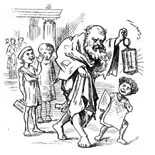
Motives of Credibility: The Miracles of the Saints
EVIDENCE & EYEWITNESSES
Miracles can be a contentious topic in Protestant circles, even among those who do not attempt to explain away those of Jesus and the Apostles chronicled in the New Testament as having a purely natural explanation. The question for such Protestants is not whether God can perform a miracle but if He still does today. As a young evangelical, I encountered a variety of Protestants who attested to the continuation of the miraculous, from speaking in tongues to bodily healings to exorcisms — many were members of charismatic movements such as that found in the Assemblies of God, the world’s largest Pentecostal denomination.
As I became more deeply invested in Calvinism (and joined a Presbyterian church), I became increasingly suspicious of claims of the miraculous. It wasn’t that I thought God incapable or unwilling to perform such deeds in the present day, but rather, following John Calvin’s argument in his Institutes of the Christian Religion, that the purpose of miracles was to confirm the authority of the Gospel messengers in the apostolic age, and they were thus no longer necessary. If God did indeed perform miracles in our time, they were for those weak in faith who were incapable of trusting Him as He has revealed Himself in Holy Scripture. As Martin Luther preached, “Thanks be to God that we have no longer any need of miracles; the Gospel doctrine has been established by signs and wonders sufficient, so that no one has any cause to doubt them.”
Miracles were central to the debates at the time of the Reformation. Luther believed that the many miracles claimed by the Catholic Church were actually demonic; Calvin similarly attributed contemporary miracles to “sheer delusions of Satan.” Catholic apologists, in turn, demanded Protestants authenticate what the Church viewed as novel religious beliefs, such as sola scriptura or sola fide, with visible signs. “First, I say then that no one should allege an extraordinary mission unless he prove it by miracles: for, I pray you, where should we be if this pretext of extraordinary mission was to be accepted without proof?” states St. Francis de Sales in his treatise The Catholic Controversy. “The true Church of believers is to be ever accompanied by miracles; there is no Church of our age which can show them save ours, therefore ours alone is the true Church.” In responding to Catholic demands for miracles, Calvin argued that the Reformers were “not forging some new gospel, but are retaining that very gospel whose truth all the miracles that Jesus Christ and his disciples ever wrought serve to confirm.” Thus, Protestants asserted, no miracles should be expected to authenticate the Reformation.
Yet what is particularly astounding is that while Reformation-era and post-Reformation Protestants rejected post-biblical miracles, they did not deny the reality of many supernatural phenomena, such as ecstatic seizures, levitations, and luminous irradiance, as Yale religious historian Carlos Eire explains in his superb book They Flew: A History of the Impossible (2023). These Protestants simply credited such occurrences to the Devil, and those who believed in or performed them were guilty of magic, superstition, or idolatry. “The shocking truth is that both Protestants and Catholics professed belief in human flight and tried to sort out the airborne among them,” Eire writes. Between the 1560s and 1680s, at least 100,000 witch trials took place across Christian Europe, resulting in approximately 50,000 executions in both Catholic and Protestant realms, including predominantly Calvinist Scotland.
You May Also Enjoy
It is a cruel irony that, in less than a century, Catholics have gone from being victimized as unwelcome immigrants to being widely perceived as racist victimizers.
Would I have learned to appreciate classical music — and even the very best of jazz or blues — if I hadn’t first learned to appreciate the best of rock and pop?
The Astros' systematic cheating vitiated the sanctity not only of the game of baseball but a core feature of American identity.

